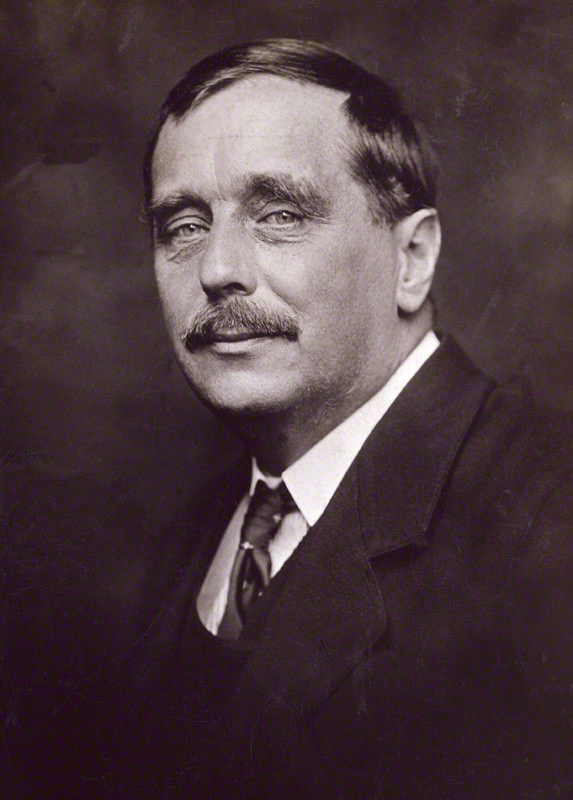Герберт Джордж Уэллс знаменитые цитаты
Герберт Джордж Уэллс Цитаты о мужчинах
„Человек, который жрёт, как свинья, должен и выглядеть, как свинья.“
«Правда о Пайкрафте»* Мысль — удивительная вещь: то она течет медленно, как смола, то вспыхивает мгновенно, как молния.
«Чудотворец»
Лев Успенский, «Записки старого петербуржца»
Среди них есть и такие тупицы, которые способны отменить преподавание химии, если только не заверить их, что это «пролетарская» химия, или наложить запрет на любой орнамент, как реакционный, если в нём не фигурирует сочетание букв РСФСР...
And in the face of gigantic difficulties they are trying to rebuild a new Russia among the ruins. We may quarrel with their principles and methods, we may call their schemes Utopian and so forth, we may sneer at or we may dread what they are doing, but it is no good pretending that there is no creative effort in Russia at the present time. A certain section of the Bolsheviks are hard-minded, doctrinaire and unteachable men, fanatics who believe that the mere destruction of capitalism, the disuse of money and trading, the effacement of all social differences, will in itself bring about a sort of bleak millennium. There are Bolsheviki so stupid that they would stop the teaching of chemistry in schools until they were assured it was "proletarian" chemistry, and who would suppress every decorative design that was not an elaboration of the letters R.S.F.S.R. ...
4. Созидательная работа в России.
перевод с уточнениями
Россия в тенях (1920)
Источник: Герберт Уэллс. Россия во мгле http://lib.ru/INOFANT/UELS/russia.txt. Собрание сочинений в 15-ти томах. Т. 15 / пер. И. Виккер, В. Пастоев. — М.: Правда, 1964.
Источник: Russia in the Shadows by H. G. Wells http://www.gutenberg.net.au/ebooks06/0602371h.html
Герберт Джордж Уэллс цитаты
„Наша истинная национальность — это человечество.“
Our true nationality is mankind.
«Очерки истории цивилизации», глава 41
видимость
Источник: Война миров
страус, птица, бриллиант
Источник: рассказы
муравьи
Источник: рассказы
сон
Источник: Машина времени
мысли
Источник: Очерки истории цивилизации
птица
Источник: Война миров
„Ругаться так красноречиво и замысловато мог только образованный человек.“
ругань
Источник: Человек-невидимка. Рассказы (сборник)
I confess that I approached Stalin with a certain amount of suspicion and prejudice. A picture had been built up in my mind of a very reserved and self-centred fanatic, a despot without vices, a jealous monopolizer of power. <…> I still expected to meet a ruthless, hard—possibly doctrinaire—and self-sufficient man at Moscow; a Georgian highlander whose spirit had never completely emerged from its native mountain glen. Yet I had had to recognize that under him Russia was not being merely tyrannized over and held down; it was being governed and it was getting on. <…> All such shadowy undertow, all suspicion of hidden emotional tensions, ceased for ever, after I had talked to him for a few minutes. <…> But Stalin was almost as much a trained mind, trained in the doctrines of Lenin and Marx, as those governess-trained minds of the British Foreign Office and diplomatic service, of which I have already written so unkindly. He was as little adaptable. <…> Sometimes I seemed to get him moving as I wanted him to move, but directly he felt he was having his feet shifted, he would clutch at some time-honoured phrase and struggle back to orthodoxy. <…> I have never met a man more candid, fair and honest, and to these qualities it is, and to nothing occult and sinister, that he owes his tremendous undisputed ascendency in Russia.
гл. 9, 9; перевод с англ. яз., Wells, H.G. (1934), Experiment in Autobiography, New-York, p. 685-690.
Опыт автобиографии (1934)
Источник: Experiment in Autobiography by H. G. Wells, 1934 http://www.gutenberg.ca/ebooks/wellshg-autobiography/wellshg-autobiography-00-h-dir/wellshg-autobiography-00-h.html
марсиане
Источник: Война миров
Герберт Джордж Уэллс: Цитаты на английском языке
The Informative Content of Education http://books.google.com/books?&id=vLs4AAAAMAAJ&q=%22I+believe+that+the+crazy+combative+patriotism+that+plainly+threatens+to+destroy+civilisation+to-day+is+very+largely+begotten+by+the+schoolmaster+and+the+schoolmistress+in+their+history+lessons+They+take+the+growing+mind+at+a+naturally+barbaric+phase+and+they+inflame+and+fix+its+barbarism%22&pg=PA242#v=onepage Speech http://archive.org/stream/reportofbritisha37adva#page/242/mode/2up given at the annual meeting of the British Association for the Advancement of Science in Nottingham, England on 2 September 1937
Источник: The First Men in the Moon (1901), Ch. 13: Mr. Cavor Makes Some Suggestions
Источник: The Invisible Man (1897), Chapter 10: Mr. Marvel's Visit To Iping
Источник: The Island of Doctor Moreau (1896), Ch. 14: Doctor Moreau Explains
“Humanity either makes, or breeds, or tolerates all its afflictions, great or small.”
Joan and Peter: The Story of an Education (1918)
“Human history is in essence a history of ideas.”
Источник: The Outline of History (1920), Ch. 40
“An animal may be ferocious and cunning enough, but it takes a real man to tell a lie.”
Источник: The Island of Doctor Moreau (1896), Ch. 21: The Reversion of the Beast Folk
“I was never a great amorist, though I have loved several people very deeply.”
An Experiment in Autobiography http://gutenberg.ca/ebooks/wellshg-autobiography/wellshg-autobiography-00-h-dir/wellshg-autobiography-00-h.html (1934)
The Work, Wealth and Happiness of Mankind, Ch. 11 (1931)
Источник: The Island of Doctor Moreau (1896), Ch. 14: Doctor Moreau Explains
“For adaptations based on the novel see The War of the Worlds (disambiguation).”
The War of the Worlds (1898)
Источник: The Island of Doctor Moreau (1896), Ch. 17: A Catastrophe
Источник: The Island of Doctor Moreau (1896), Ch. 16: How the Beast Folk Tasted Blood
Источник: The Island of Doctor Moreau (1896), Ch. 22: The Man Alone
“Stalin-Wells Talk: The Verbatim Report and A Discussion”, G.B. Shaw, J.M. Keynes et al., London, The New Statesman and Nation, (1934) p. 15
“Stalin-Wells Talk: The Verbatim Report and A Discussion”, G.B. Shaw, J.M. Keynes et al., London, The New Statesman and Nation, (1934) p. 19
